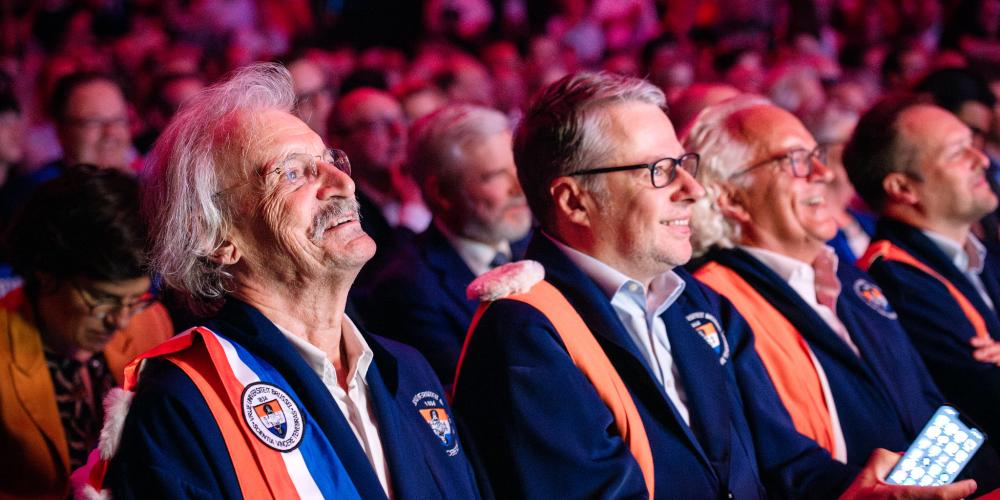
The Vrije Universiteit Brussel opened the academic year with the Celebration of the Open Mind – an event that felt more like a festival than a stiff academic ceremony. Songwriters, comedians, and speakers took turns on the stage at the Royal Circus. Not that the substance was left behind in the lecture halls and labs. On the contrary, VUB’s core values were firmly highlighted. Jan Danckaert remarked, “The university is a brave space.” And so, the Open Mind spread across the large audience, not like the Catholic seven deadly sins, but as seven refreshing delights: wisdom, defiance, tolerance, curiosity, compassion, openness, and humour.
WISDOM
“There are colleagues who sometimes compare the university to a circus,” Jan Danckaert began his speech. “Well, now we really are in a circus.” He set the tone for the evening. “Our university must be an incubator for open minds. We must help students grow, focusing on curiosity, self-development, and dialogue.” He emphasised that at the VUB, every religion is respected, but it remains a private matter. “We want religion to have no influence on the public sphere. Students should study, and scientists should conduct research, free from external pressure – and that also means without self-censorship.” The university, he said, is a true arena for debate and clashing ideas. The university as a whole should not be a safe space, but a brave space.
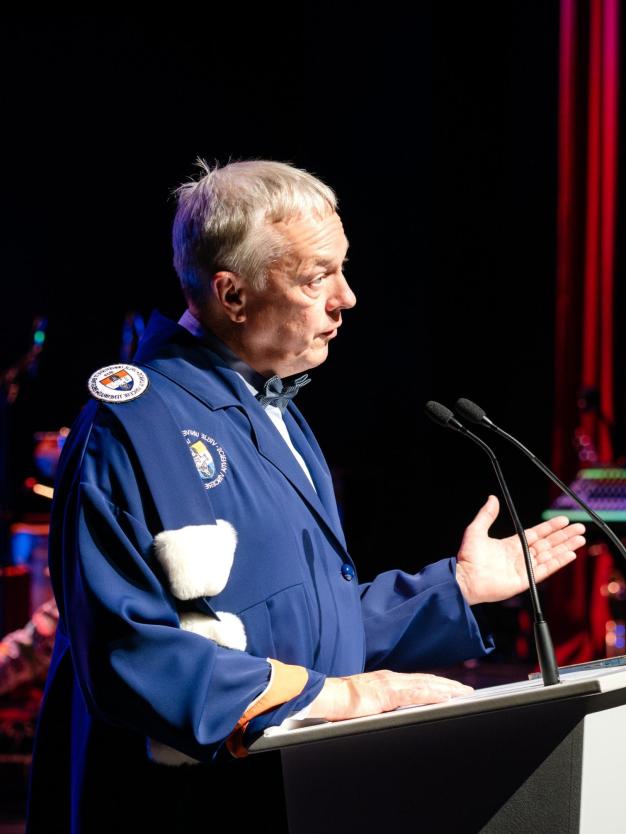
"The history of scientific progress is a history of freethinkers."
The history of science proves that it can be shaped by people from all beliefs. It has been driven by those who think beyond their own frameworks. Whether it was the Persian Muslim Al-Khwarizmi, who introduced the concept of zero to mathematics in the 9th century, or the American Puritan Benjamin Franklin, who demonstrated in the 18th century that lightning is an electrical phenomenon. Or the British Ada Lovelace, who in the mid-19th century wrote the first computer programme, calling herself the 'Bride of Science'. “The history of scientific progress is a history of freethinkers, regardless of their deepest convictions.”
The rector concluded by calling for a commitment to the open mind. Everywhere, both near and far, freedoms are under pressure: from authoritarianism, from war, from fanaticism, and from excessive profit-seeking. “The future of our society, of science, and of humanity depends on it.”
Director of the Hannah Arendt Institute and VUB Fellow Christophe Busch sought guidance from a philosopher in his search for a moral compass. "Evil in our imagination is always ‘the other’, rarely ‘ourselves’." Busch based his speech on philosopher Hannah Arendt, also a hero of the late rector Caroline Pauwels. Hannah Arendt coined the concept of ‘the banality of evil.’
“Perpetrators are not Mad or Bad,” Busch explained. “That is too simplistic and a mistaken analysis. They turn out to be people just like you and me." It is not deviance that lies at the root of evil, but thoughtlessness. The perpetrator of evil does not think for themselves. “Adolf Eichmann, and so many perpetrators then and now, do not think for themselves but outsource their thinking to a corrupt ideology, a fallen religious or other intellectual framework.” The result is a process of radicalisation that eventually leads to the justification of violence. He concluded with the words of Hannah Arendt: “Thinking itself is dangerous. But not thinking is even more dangerous.”
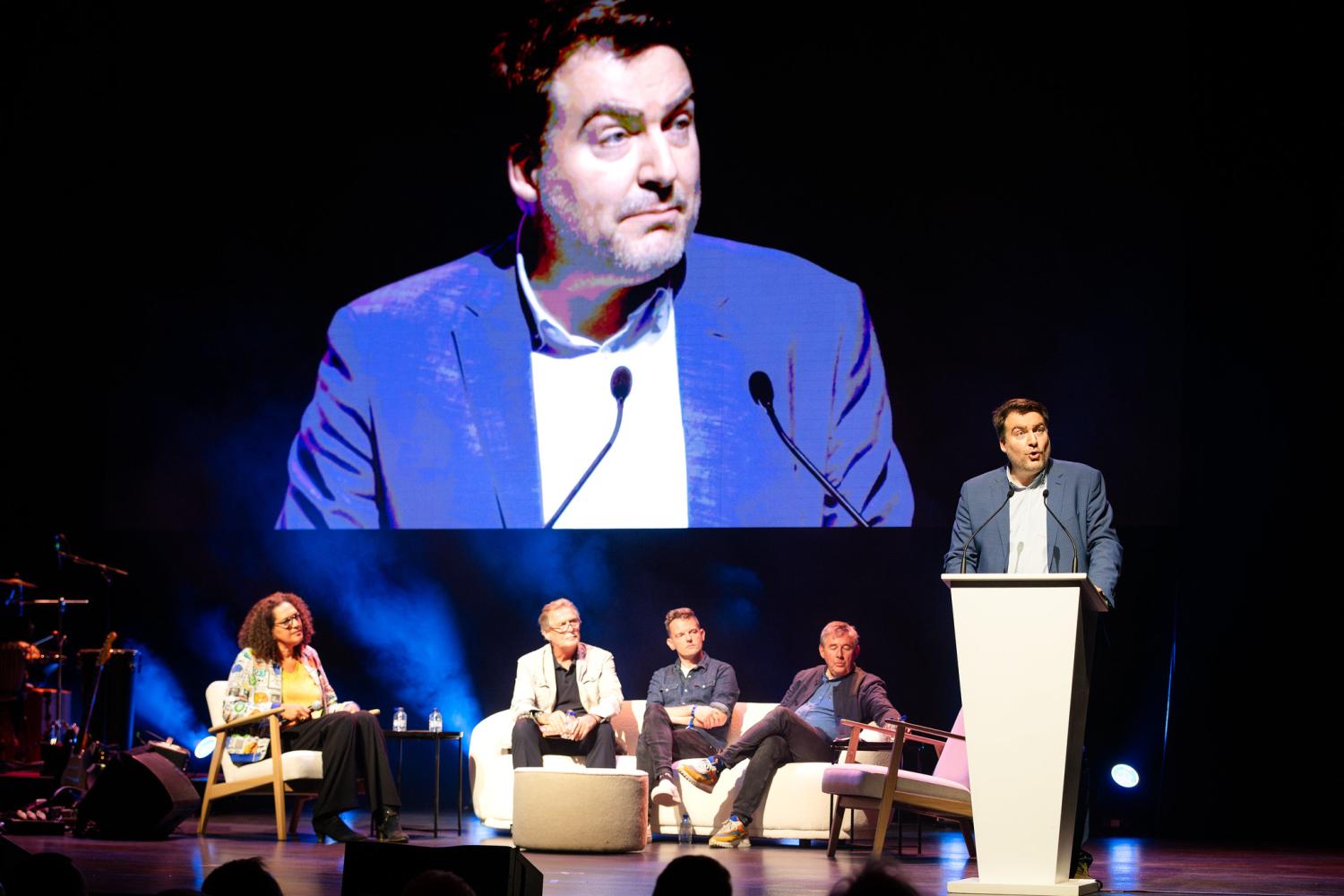
Christophe Busch at the podium: "Perpetrators are not Mad or Bad."
DEFIANCE
Rudi Vranckx, conflict journalist and honorary doctor of the VUB, expressed his anger from the stage over the indifference of today’s world. “The search for truth is even being cast into doubt these days,” he said with a sombre expression.
"Meanwhile, international politics drifts aimlessly."
“I never thought I would end up in a world with two major wars—or should I say massacres—in Ukraine and the Palestinian territories. And let’s not forget Sudan, where 2.5 million people are at risk of dying. Meanwhile, international politics drifts aimlessly, lost in embarrassed avoidance, hypocrisy, and double standards. Clearly, a dead Gazan or Sudanese is not worth as much as one of us.”
He placed his hope in the defiance of the youth. “Who protested at universities against the suffering in Gaza and the occupation of the Palestinians? It’s always a new generation of young people. You, in other words. Students who are still developing a moral compass with a view towards the future.”
This translation stays true to the original’s emotive and critical tone, while flowing naturally in British English. Key ideas like "drifts aimlessly" and "moral compass" reflect the speaker's concerns and hope for the next generation.
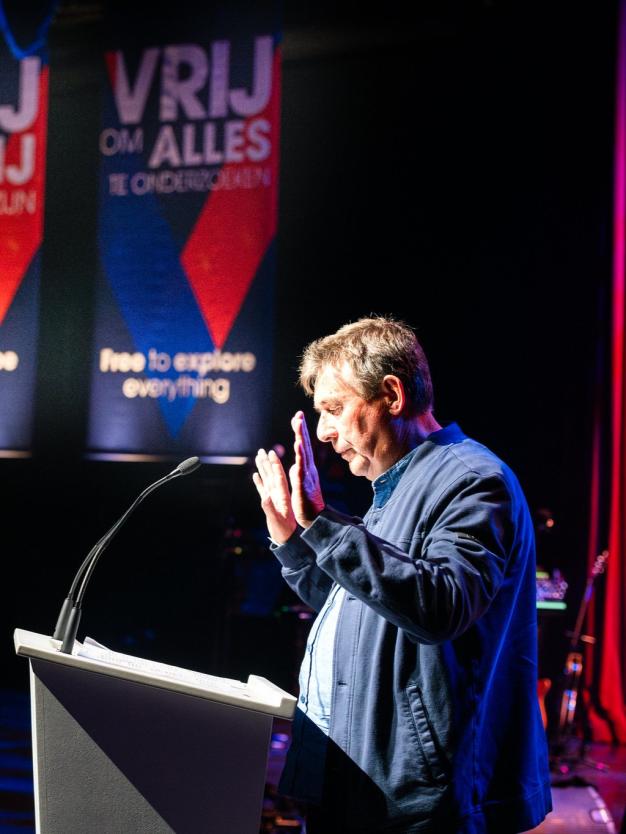
Oncologist Professor Wim Distelmans has been a leading figure in the fight for self-determination at the end of life for decades. He recounted the origins of the current euthanasia legislation and explained that there is still a long way to go.
“People should be able to maintain as much control as possible over their end of life.”
By the end of the 1990s, it became clear that palliative care could never completely alleviate the unbearable suffering of some patients. “Some people were in such agony that they even begged for their lives to be ended," but this was legally prohibited. Thanks in part to the VUB’s pioneering work in palliative care—led by Distelmans—and the VUB research group 'End-of-Life Care', which found that around half of all deaths were preceded by a life-shortening decision—often without the patient’s knowledge—the euthanasia law was passed in 2002. The Palliative Care Act and the Patient Rights Act were also enacted at that time. Since very few people were familiar with these laws, Distelmans founded the End-of-Life Information Forum (LEIF), a forum providing everyone with objective information and advice on end-of-life decisions. “When people are well-informed, they can make decisions freely and maintain as much control over their end of life as possible, without interference or paternalism.”
Distelmans continues to fight for the expansion of the euthanasia law to include those who are no longer mentally competent. “In cases of dementia, you currently have to follow the path taken by Hugo Claus and, more recently, Jan Ceuleers: requesting euthanasia while you are still able to ask for it and are mentally capable. Far too early, in other words. It’s incomprehensible that politics makes this so difficult. After all, no one is forced to request or participate in euthanasia.”

Legendary advocate for the right to euthanasia, Wim Distelmans, at the Celebration of the Open Mind: "No one is obliged to request euthanasia or to participate in it."
TOLERANCE
“Homosexuality is not a crime, but it is a sin,” writes the current pope. Radio host and opinion maker Tom De Cock has a happy family with his husband, adopted daughter, and foster son, but still sees a great deal of intolerance in the world. “Every one of the hundreds of organised religions on this planet has a big problem with gay people. In fact, they’re obsessed with sex in general. There’s more about sex on the Vatican’s website than on Pornhub.” How many victims must an organisation like that create before we stop pretending the pope is a rock star?
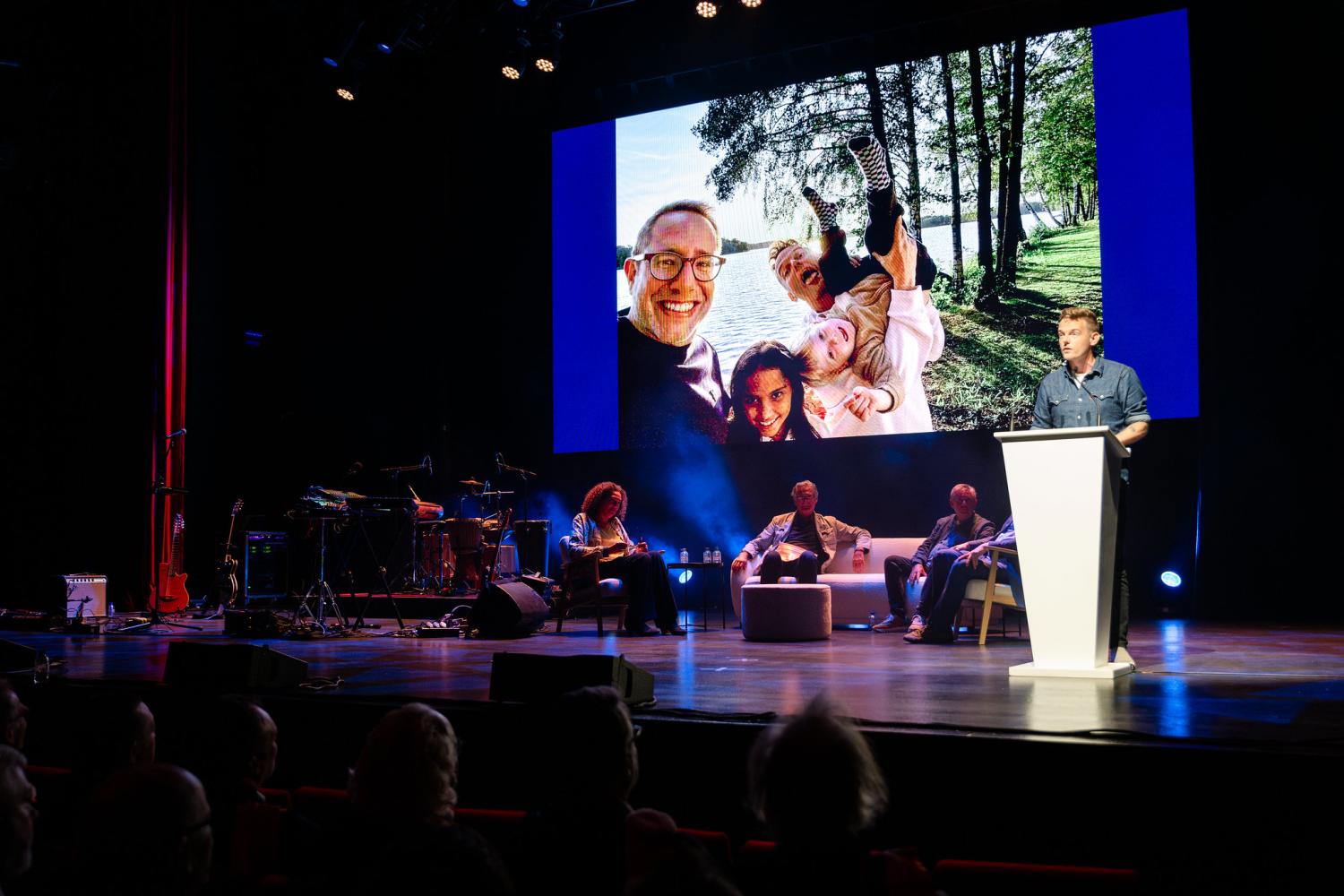
Tom De Cock: "Sharpening minds. Disagreeing with each other. And that can be messy and uncomfortable, but it's the only way forward."
De Cock advocates not only for freedom of religion, but also for a society where religion has no influence on its organisation. “Imagine a world entirely free from religion. Not through aggression – I’m not Brusselsmans, keep your daggers safely sheathed. But simply through what we’re doing here: openly expressing our doubts. Sharpening minds. Disagreeing with each other. And that can be messy and uncomfortable, but it’s the only way forward.”
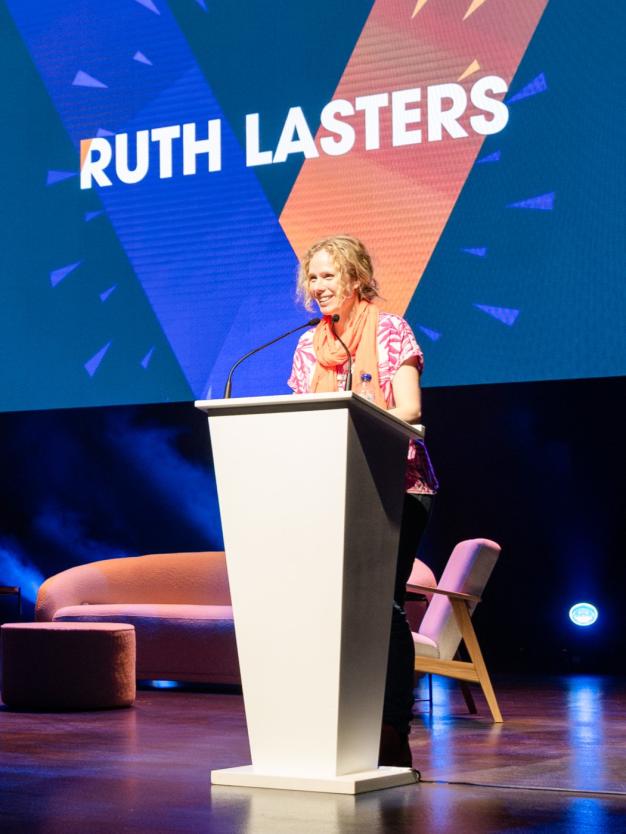
Former Antwerp city poet Ruth Lasters put the Antwerp NV-A party on the spot in 2022 with her poem Ransom. She had written it together with her students from the Spectrumschool in Borgerhout, aiming to express the feelings of inferiority experienced by students in vocational education. The Antwerp alderman for Culture refused to acknowledge the poem, leading Ruth Lasters to resign. At the Open Mind Festival, she recited Ransom once more. In its verses, she stands up for the working class, often undervalued by many—seen as second-rate citizens in our society: stair builders, mechanics, and all those with calloused hands.
"Do you know everything, like we, mechanics, do about the correct tension on camshaft bolts or how to replace a timing belt for perfect valve timing? We should start talking about A- and B-ministers. Maybe then they'd understand how it feels." Hopefully, the academics in the room got the message. "As long as you, Flanders, don’t also call the tradesman smart in newspapers, game shows, and news reports, you’re not worthy of the A’s in your name, VlAAnderen."
CURIOSITY
Sara Leemans is a theatre maker and the creator of the podcast Dansaertvlamingen. As a student at the VUB, she spent more time at student parties than in lecture halls. "For those who didn’t attend VUB: it wasn’t uncommon for me to see the professor for the first time at the exam." Yet, she is well aware of the importance of curiosity and having the opportunity to be curious. “In other parts of the world, women are systematically denied the right to education. Girls are kidnapped or systematically poisoned to keep them out of classrooms and lecture halls. In 2021, an entire generation of Afghan women was barred from education.”
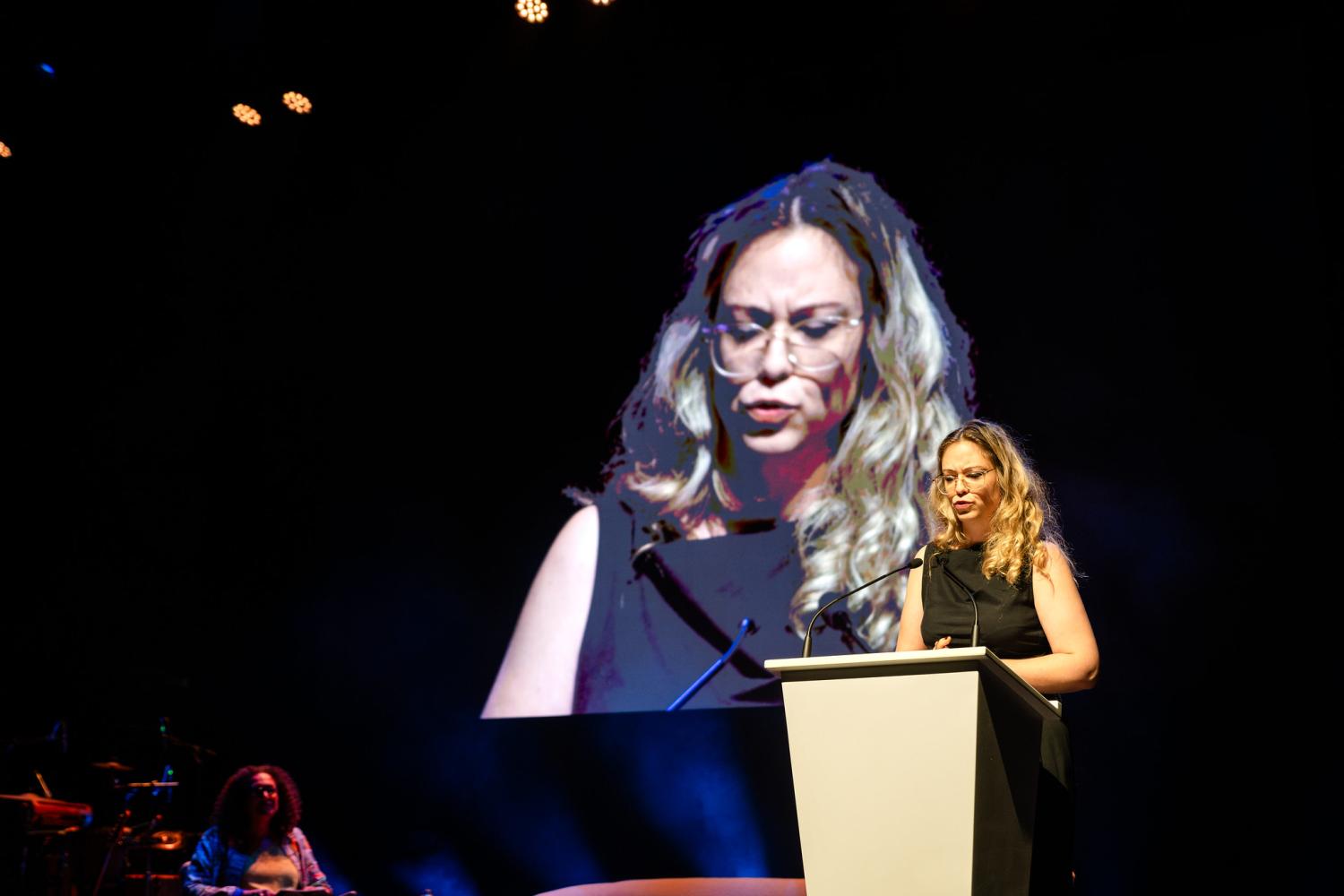
Sara Leemans: "Girls are kidnapped or systematically poisoned to remove them from classrooms and lecture halls."
She has now traded student life for the responsibilities of adulthood. The lukewarm pint has become wine. Midweek concerts are difficult to attend, as there's no babysitter to be found. But she continues to recognise how important it is to have the opportunity to sit in a lecture hall. She thinks of her niece, who is now starting her second bachelor’s degree at the VUB. “She belongs to a generation of students who, unfortunately, realise that acquired rights are not absolute rights. A free mind not only respects the freedom of others but is also aware of the fragility of one’s own rights. And I’m glad that, as a young woman, she’s in the right place to defend them.”
Social media star, actress, and screenwriter Elisabeth Lucie Baeten became widely known to the public through the TV show De Slimste Mens. In addition to this national springboard to fame, she has also gained recognition for her Instagram persona, “Katrien van Politiek PR,” where she has fictional phone conversations with politicians about their policies or recent blunders. Definitely worth checking out. At the Open Mind Festival, she read a self-penned poem, full of awareness of life’s fragile joys and the cruel hardships that people endure.
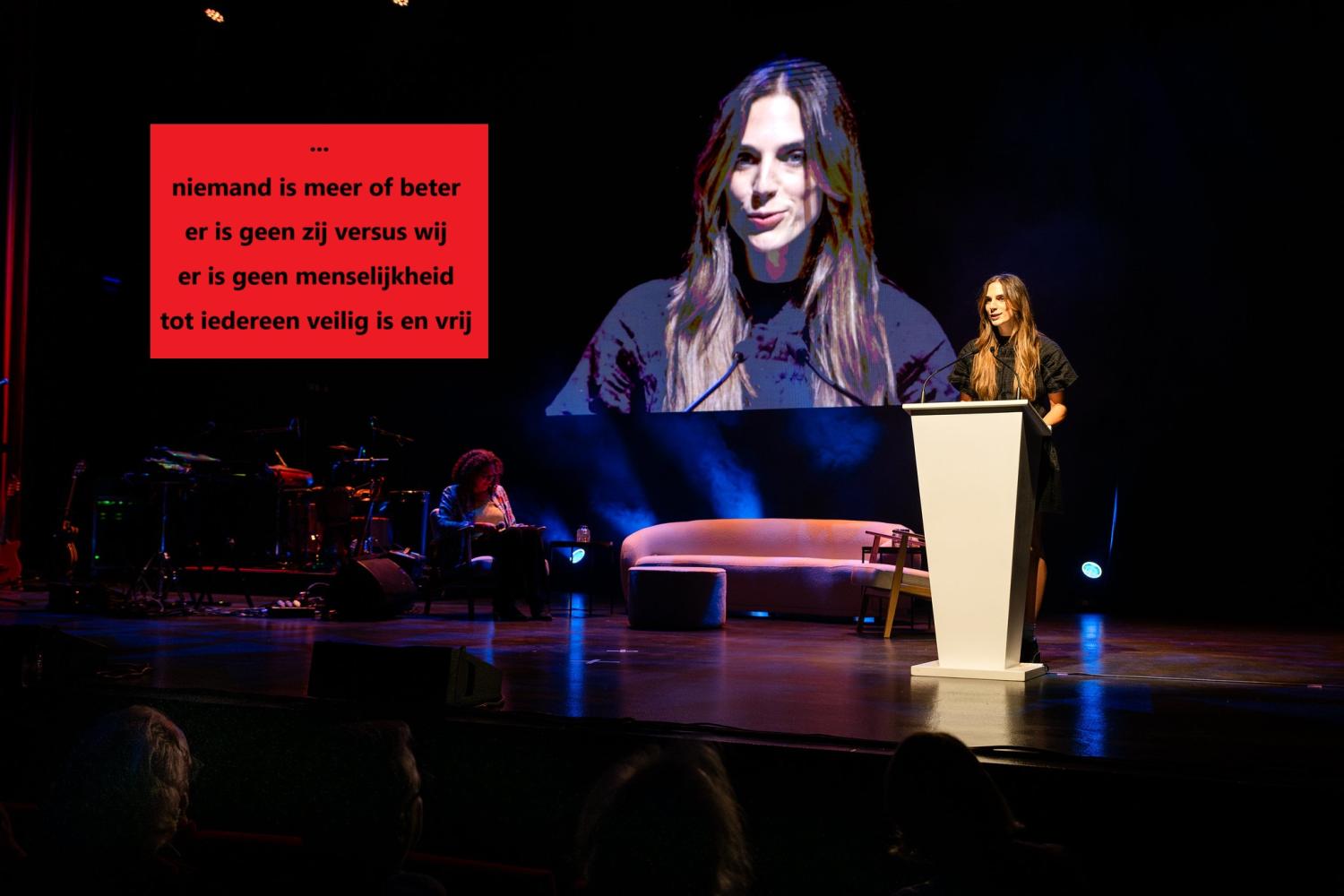
OPENNESS
One of the highlights of the evening was the awarding of honorary doctorates to two prominent figures: Guy Mortier, the legendary editor-in-chief of Humo, and Femke Lakerveld, an engaged actress and chair of Vrij Links. Both are icons in the fight for freedom of expression and culture, and they shared their perspectives with sharp wit and a critical eye.
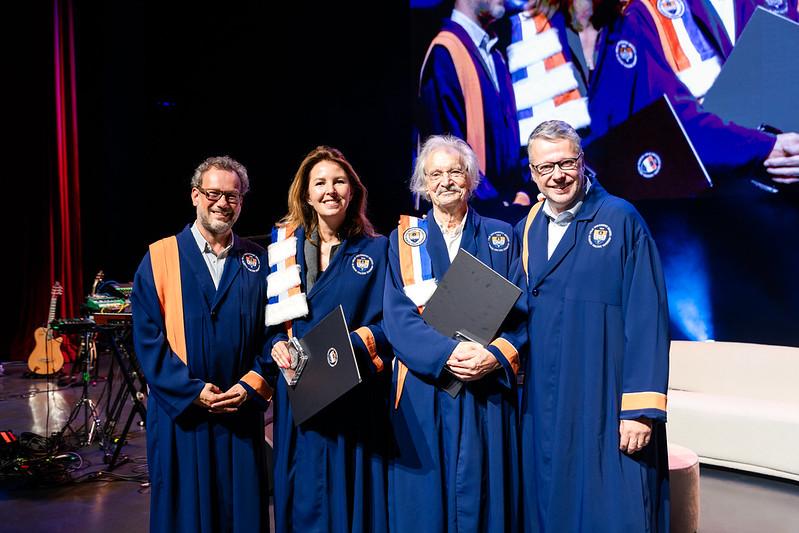
Honorary doctors Femke Lakerveld (centre-left) and Guy Mortier (centre-right) with their proximi Dave Sinardet and Pieter Ballon (right).
“Let’s support mavericks and free spirits, including those whose work we dislike or whose opinions we despise.” Femke Lakerveld did not hold back when defending the freedom of artists and scientists. The core of her message: we must remain open to the ideas of others. Even if they hurt or contradict our values, we must not censor, cancel, or forbid them. "Artists – and scientists – must be allowed to provoke. What may seem like an insult to one person could be a revelation to another."
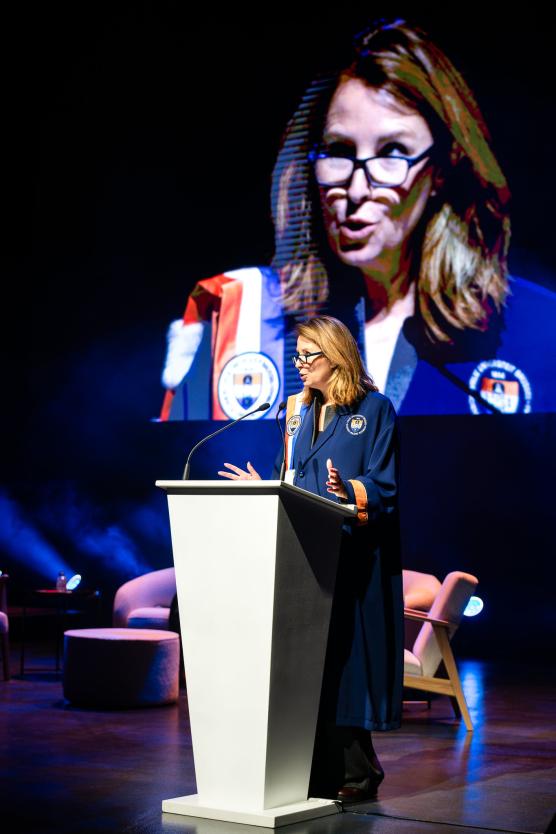
Femke Lakerveld criticised the moral straitjacket imposed on culture.
"Art must remain free from moral or educational obligations."
Femke Lakerveld spoke about the moral straitjacket being imposed on the cultural sector: “Diversity, inclusion, sustainability, accessibility, connection, bridging, entrepreneurship, innovation, participation, emancipation. Oh, wonderful, just do it all! Ambitious!” And if you don’t, the call for morality or decency is never far off. According to the Dutch commentator, art must be kept free from such moral or educational demands. “If art is made to play the role of moral guardian, we undermine the freedom of art, the artists, and ultimately, all of us.”
HUMOUR
Comedienne Dena Vahdani didn’t shy away from any sensitivities: her failed studies, her hairstyle, and her sweet mother. Video clip.
Master of wit and newly appointed VUB honorary doctor, Guy Mortier, had little trouble winning over the audience. "Frank Zappa once said: ‘The mind is like a parachute; it doesn’t work if it is not open.’ It’s actually quite close to the VUB’s motto, ‘Scientia vincere tenebras’ – overcoming darkness through science. For example, by inventing the torch, just saying."

He felt deeply honoured by the recognition bestowed upon him by the VUB. “It must have been since my first communion that I’ve felt this blessed.” However, he also saw the VUB suffering. “It’s no secret that the nerves of the VUB leadership – seated right here in front – are close to snapping, ever since the announcement that His Holiness Pope Francis will be visiting KU Leuven next week, drawing all the attention towards himself.” That’s some stiff competition in the battle for the spotlight. “The wound was salted even more when Francis sold out the King Baudouin Stadium faster than Pommelien Thijs!”
But, as Mortier joked, the VUB has still placed the crown of an honorary doctorate on the head of another "charming elderly gentleman." Though he had his own quip about that. “The VUB is an institution that upholds humanistic values, yet apparently a €20 humanistic gift voucher is too much to ask!”
“Long live the free spirit. Long live the VUB. Long live Humo!”
The Belgian band Ão provided the music at the Open Mind Festival with their blend of saudade, indie, and electronica. Ão is pronounced like "auw," but the music was more of a "wow."
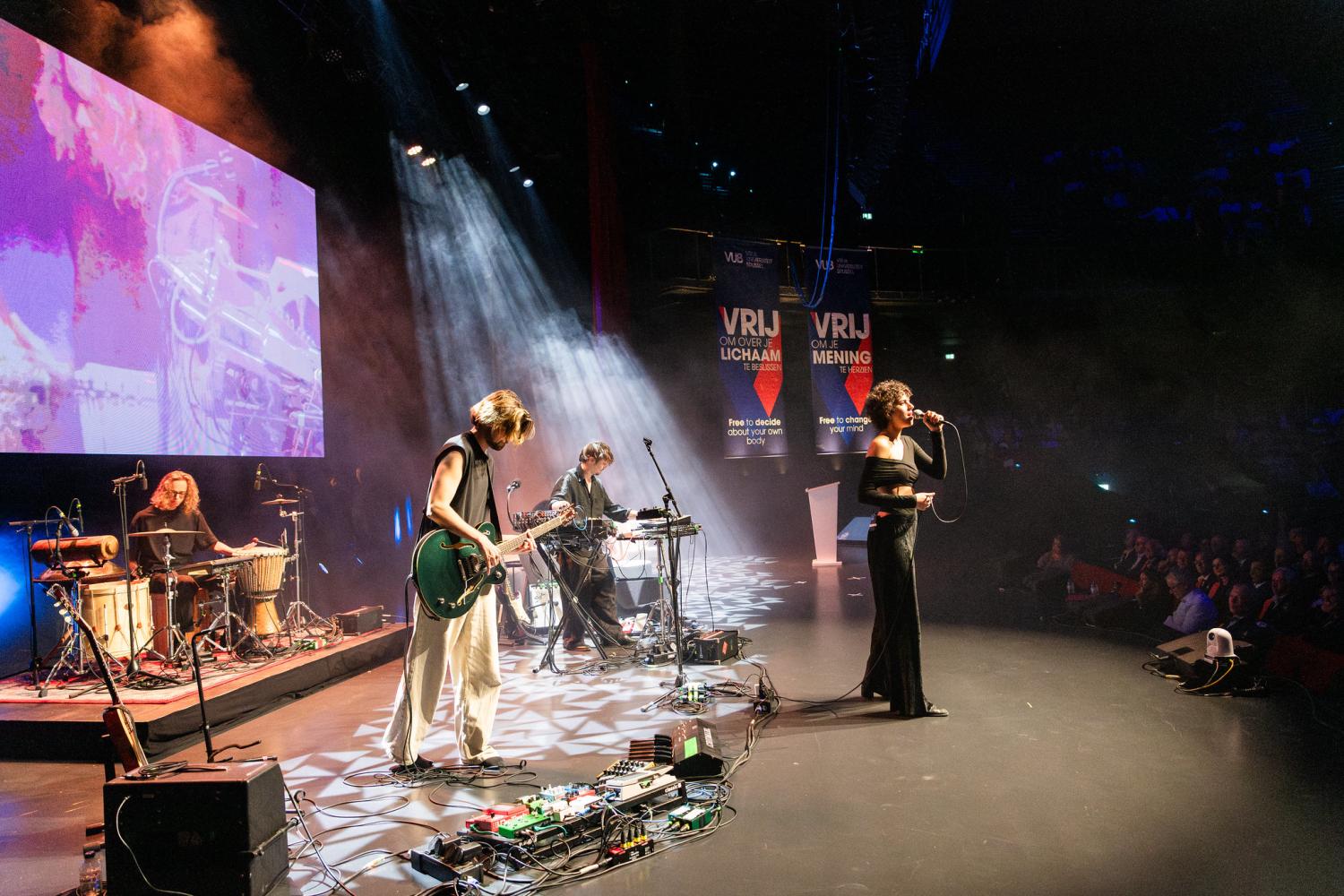
Relive the Open Mind Festival
If you want to savour the entire event at your leisure, you can watch all the videos on YouTube. The complete photo album is available on Flickr.